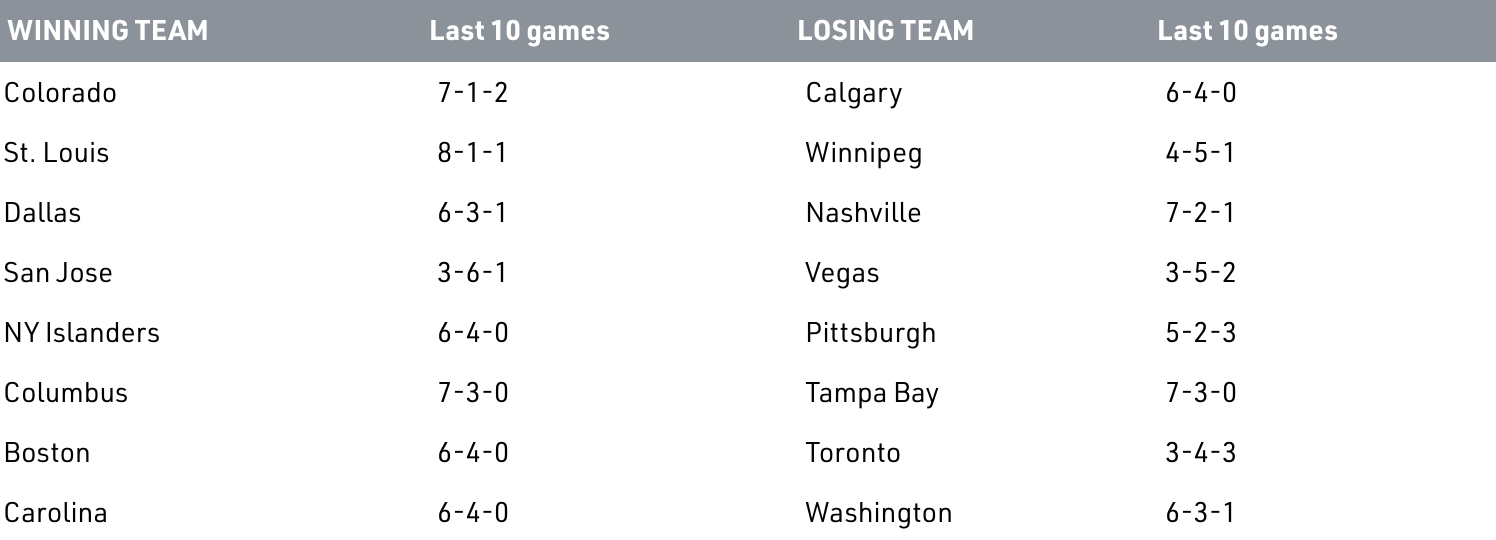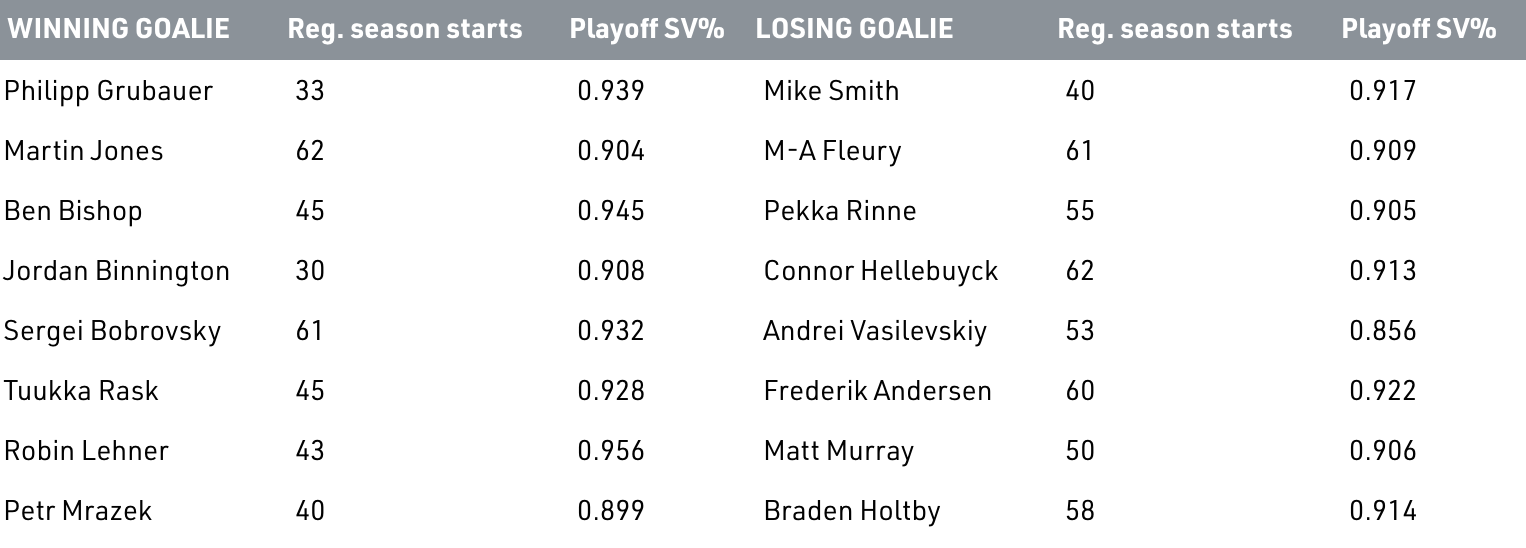All four wild-card teams advanced. The third team in NHL history to win 62 games in a regular season failed to get even one in the playoffs. The Vegas Golden Knights were up 3-1 in their series, and 3-0 with 11 minutes left in Game 7, but still couldn’t get out of Round 1. Only three of the nine teams to hit 100 points this season are still standing.
Just as we all predicted.
The first round of the 2019 Stanley Cup Playoffs will go down as one of the wildest, least predictable ever. From a shocking sweep to a couple of overtime Game 7s, the second round has a lot to live up to. Before we move on, we take one look back at some things we learned from the first two weeks of the playoffs.
[snippet id=4558775]
Enter the playoffs on a high note
The hottest teams mostly got through. The only team to advance that didn’t win at least six of their final 10 regular season games were the San Jose Sharks, who beat a similarly struggling Vegas in seven. The Lightning were knocked out by a Blue Jackets team surging at the right moment. And the No. 8 seed Colorado Avalanche lost only one regulation game in their final 10, while top-seed Calgary dropped its last two in a row.
Finishing strong isn’t always an indication of incoming playoff success. In 2018, the Anaheim Ducks won eight of their last 10 games and were swept by the San Jose Sharks, who finished 5-4-1. And it may actually lose significance the deeper into the bracket you go. Last year’s Capitals finished 8-2-0, but the 2017 champion Penguins came in 4-4-2.

Rest your starter in the regular season to have post-season success
As Ryan Dixon highlighted in our takeaways from the regular season, it’s more important than ever to have two capable goalies in your stable. No. 1 goalies are seeing their workloads decline as teams choose to keep them a little more rested for the playoff season. And if you want to even get that far, your backup goalie can’t be a liability in relief.
Take Tuukka Rask for example. He started only 45 games this season, which was the fewest he’d played in a full season since Tim Thomas left the team in 2012. He had his ups and downs throughout the regular season, finishing on a down note, but leaves Round 1 with a .928 save percentage. Bruins head coach Bruce Cassidy said it was a benefit of resting Rask more often.
Of the 17 goalies who started at least 50 regular season games, nine made the playoffs and just two remain in the second round. It’s not that putting your No. 1 goalie in the crease for 50 or more games dooms you to an early playoff exit. Braden Holtby won the Stanley Cup last year after playing 59 games and Bobrovsky is just finishing up the best playoff round of his career. But it’s worth noting four of the best five performances in Round 1 were by goalies who started no more than 45 games.

Don’t be shy to take a swing at the trade deadline
Had the Columbus Blue Jackets missed the playoffs completely, it may have encouraged some teams to take a less aggressive approach to the trade deadline in 2020. After all even though they were in a traditional selling position, with their two best players (Sergei Bobrovsky and Artemi Panarin) clearly set on leaving via free agency this summer, GM Jarmo Kekalainen went in hard as a buyer.
Pushing most of his chips in, he acquired a collection of pending UFAs in Matt Duchene, Ryan Dzingel, Adam McQuaid and Keith Kinkaid. Kekalainen doubled down on what he had and, when the dust settled, he put together the best team Columbus had ever had on paper.
If it failed, future GMs would surely balk at taking the same approach.
“If I had just traded Panarin for picks and Bobrovsky for picks, everybody in our fan base and city would’ve said ‘f—ing Blue Jackets, that’s all they ever do is just trade for picks and they tell us we’re going to be good in the future, just wait, be patient.’ No,” Kekalainen told Sports Illustrated’s Alex Prewitt. “We wanted to send a message to the fan base and the locker-room at the deadline that we’re serious about winning. If it doesn’t translate to winning, hey, I’ll take responsibility.”
Duchene was arguably Columbus’s best player in the first round, ending as the team’s scoring leader with three goals and seven points in four games. Dzingel was held off the score sheet, but was a plus-3 and his contributions down the regular season stretch (12 points in 21 games) helped as Duchene was finding his footing.
Some of the biggest swings taken by GMs at the trade deadline worked out very well. Kevin Hayes was Winnipeg’s best even strength offensive producer from the time he was acquired until the end of the regular season. He added three points in six playoff games and had the best shot share of all Winnipeg’s top six forwards in the playoffs.
Mats Zuccarello broke his arm playing his first game for Dallas and returned on the last day of the regular season. Quietly one of the best set up men in the NHL today — ranking 21st in primary assists per 60 minutes at even strength this season — he scored three goals in the opening round and his presence is giving Dallas a second line capable of creating some offence; a quality the team lacked all season.
And of course Mark Stone, the jewel of the 2019 trade deadline, tore up the competition, finishing Round 1 as the leading scorer with six goals and 12 points.
[snippet ID=3322139]
A couple of rookie defencemen arrived in a very big way
Let’s start in Dallas where Miro Heiskanen averaged a staggering 26:32 of ice time in Round 1, which trailed only Erik Karlsson, Brent Burns and Kris Letang. Heiskanen’s 22:37 average of even strength ice time was second to only Burns (23:10).
Meanwhile in Colorado, Cale Makar arrived in time for Game 3, after his NCAA career ended with a Hobey Baker Award win. Though he was used in very favourable situations, getting 70.59 per cent of his starts in the offensive zone, Makar recorded a goal and an assist, as the Avs controlled 65.96 per cent of the 5-on-5 shots when he was on the ice.[sidebar]
Heiskanen was the third overall pick in the 2017 draft and Makar followed him at No. 4. And with fifth overall pick Elias Pettersson taking the league by storm in the regular season, are New Jersey (Nico Hischier) or Philadelphia (Nolan Patrick) starting to ponder, what if?
Vegas-San Jose has quickly become one of the NHL’s best rivalries
The Golden Knights have only been around for two years, but both times they met the Sharks in the playoffs — winning last year in six games, losing this year in seven.
And this season we really got the feeling there was some mutual hate between the two. A real rivalry, if you will.
The chirps were lobbed back and forth between the two camps most of the series and the way in which it all ended will not soon be forgotten.
Let’s start in Game 3. Ryan Reaves and Evander Kane fought, with Vegas’ bruiser clearly coming out on top, but Joe Thornton gave the decision to Kane in his post-game comments, saying it was “tough to see” Reaves go down. That led to Reaves shooting back at the 39-year-old, saying he obviously couldn’t see very well and that “I got a buddy with a grandpa who’s going through the same thing.”
Kane jumped into the banter by saying going head-to-head with Reaves was like fighting the Muffin Man and that Reaves’ tactics were that of a WWE wrestler which, Kane continued, was where Reaves was “probably going to end up.” Reaves for his part fully embraced the idea.
It didn’t end there either.
Trailing 3-1 in the series, San Jose won Game 5 by a convincing 5-2 count and in his post-game interview Tomas Hertl all but guaranteed a Game 7.
In Game 6, he scored the overtime winner, shorthanded, to get there.
Even further, Gallant thought Logan Couture embellished to draw a high-sticking penalty in Game 5 — a play Couture lost teeth on — and Sharks coach Peter DeBoer believed Gallant was jawing at his player. It wasn’t the first time DeBoer saw that from his counterpart and he let the media know about it after Game 6.
“I mean, there’s still chatter,” DeBoer told the San Jose Mercury News. “Their coach is chattering. He’s probably doing the most chattering. He’s talking to our players constantly during the game, which I haven’t seen before.
“That’s probably where most of the chatter’s coming from now. The players are playing.”
When Gallant was asked about DeBoer’s comments ahead of Game 7, you could feel tension.
“I really don’t want to talk about that, but I think I’m going to have to a little bit,” Gallant said via the Las Vegas Review Journal. “Because for that clown to say that in the paper yesterday, it’s not right.”
“Logan Couture, I thought it was embellishment, so I’m yelling at the referee, not Logan Couture. The other one was Game 2. Evander Kane is yelling at Ryan Reaves between the bench and Evander yelled at me and said, ‘Hey coach, when are you going to send your big guy out on the ice and play him more than four minutes?’ I said, ‘He’s played 10 minutes every game and he’s going to play a lot more.’
“Those were the two times. If I’m going to be a chirper and a loudmouth, I think people know me as a coach and respect me as a coach. If he’s going to yap about it, that’s a little unclassy for me.”
In Game 7, after a controversial five-minute major was given to Cody Eakin, Vegas allowed four goals on the ensuing power play to blow their 3-0 lead. A last gasp effort sent it to overtime, where again the Golden Knights were foiled.
Please, please, please, let’s do this again next spring.
Maybe referees should be able to review five-minute majors
Further to the furor mentioned above, the major penalty given to Eakin at a crucial point in Game 7 opened the door wide open for the Sharks to get back into the game. Now, you can’t blame Vegas’ series loss on the call — they did hold a 3-1 series lead at one point, and in no way are four goals on the same power play the fault of the officials.
But that such a monumental penalty was erroneously called does beg the question: should referees be able to review a game-changing call such as this, to make sure it’s right? We probably don’t want to go down the road of reviewing all penalties, and you could argue we’ve already gone too far with offside reviews, but should refs be allowed to double check five minute calls at least?
“They called five minutes for that? Why don’t you have hockey replay or something? It changed the whole outcome of the game,” Jonathan Marchessault said after the Game 7 loss. “Seriously. What is that? It’s so disappointing. The game is not even close, it’s 3-0. Call the two, OK, but a five? With something you don’t even see? You just called the outcome. It’s a joke, that’s what it is. It’s embarrassing.”
[relatedlinks]








